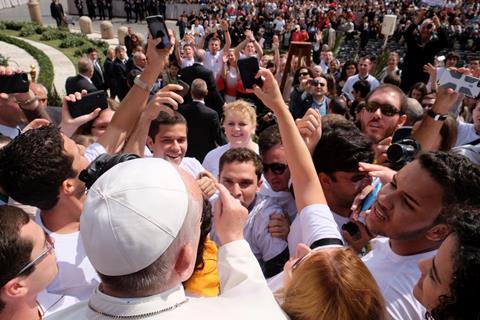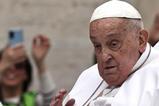Emily Nelson shares her experience of becoming a Catholic, and comments on the ‘sacred surge’ of young people also choosing to join the Catholic Church.

The Catholic Church has faced, often warranted criticism, for decades. Considering its public perception and the pervasiveness of secularisation, it often comes as a surprise the numbers of (particularly young people) who have been flocking to the Catholic Church in recent years.
A recent article by the New York Post entitled “Young people are converting to Catholicism en masse — driven by pandemic, internet, ‘lax’ alternatives”, well worth a read, explores this phenomena.
This piece grabbed me through its exploration of real stories alongside critical analysis to understand the reasons underpinning these remarkable trends.
“I begged God to not make me Catholic”
The article outlines the experience of individuals who converted to Catholicism, both from Christian and other backgrounds. Some had investigated dozens of Christian denominations, tried to resist or faced rejection due to their conversion to Catholicism. “I begged God to not make me Catholic” one individual shared, but following much internal conflict, she attended Order of Christian Initiation of Adults classes converting in 2024. A priest interviewed noted the variety of people who come forward to join the Catholic Church, and it was reported that some Dioceses have experienced year on year increases.
READ MORE: From the revival at Asbury: The God of all eternity is here
The Post focuses on the USA, where like the majority of countries in the West there exists an overall decrease in religiosity. This is also true of the UK but despite being significantly secular for decades there is surprising growth. A study carried out by the Bible Society entitled ‘A Quiet Revival’ showed that those aged 18-24 are showing a significant increase in their interest and conversions to Christianity, and Catholicism alongside Pentecostalism exhibited the greatest increase, furthering our understanding from The Post’s article.
The reasons for these conversions were explored in both reports. The Post included the pandemic, the internet and a ‘distaste for “lax” Protestant alternatives’. The use of the internet for this purpose was articulated clearly in Word on Fire’s publication ‘New Apologetics’. This shows how the internet can be used for research, to organise events like debates more easily and to encounter individuals, particularly those seeking a faith which we otherwise never would.
READ MORE: I stayed in Asbury before the revival and I totally understand why God chose it to reveal the power of his Spirit
Through my work, I encountered a lady who ordered something online (unrelated to religion) and received alongside this item rosary beads, and a note saying the seller felt prompted to send this. She was not brought up with any faith, and had no idea what this was. When she was going through a tough time, she decided to look up online how to use it. Eventually, this led her to Catholicism.
The Post also explored the conversion of previously Protestant influencer Cameron Bertuzzi who following a debate on Church history felt “I sort of worked through the objections that I had, and I didn’t really have any objections left, and I was like ‘There’s nothing really holding me back from Catholicism, so I should probably just embrace it.’’ Many young people followed him.
This is something I encountered myself on my journey to faith. Ater significant research I concluded that Catholicism spoke the truth. A number of friends have also used tools available on internet, and often share a desire for deeply reverend worship and make use of a community provided to enhance and learn about their faith. One in particular, recently converted as a result of seeking out the truth despite his anti-Catholic Northern Irish family who would have been content with him adopting with almost any other denomination.
READ MORE: ‘I am a missionary to my own country – England’
The Quiet Revival demonstrated that in the USA, there is an increase particularly in young men becoming Christians. In the UK, young adults are more spiritual and less atheistic. This is at least in part due to a cultural shift from hostility to Christianity, to apathy and then openness. Another important factor, also cited by interviewees of The Post was the search for meaning, belonging and order in a particular generation that frequently exhibits poor mental health. They find healing and community. Ultimately, we believe that this is the power of the Holy Spirit working through these factors to bring people to God. It is not just Catholicism that is growing amongst this age group, but Christian faith. We can celebrate together souls brought to Christ.
As Catholics, we are taught that the Church will always be there, as in Matthew 16:18 “I will build my church, and the powers of death shall not prevail against it” (RSV). For decades, many researchers pushed secularisation theory, that with modernisation and time religion would eventually become extinct. We did not accept this, and now we have data to demonstrate this fact. Together, as Christians, we can cite this research and examples to demonstrate God’s power in our world today.


































1 Reader's comment